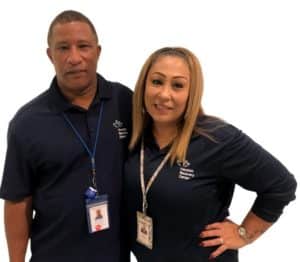Houston Recovery Center’s partnership with Harris County Community Supervision and Corrections Department (Adult Probation) started as a pilot program two years ago. It worked so well that it became a regular program.
People who struggle with substance use disorders — and assigned to the Responsive Interventions for Change (RIC) Docket — are given a second chance to get drug treatment in the community through a diversion program. They are required to have a peer recovery support specialist (aka recovery coach) when they are placed in adult probation.
 Program participants often fear going through the probation process. Thanks to our partnership, probation officers now work together with Houston Recovery Center recovery coaches who provide peer support, which helps alleviate that fear. Recovery coach Roderick Jackson says a lot of probation officers care, but don’t have time because they work with 125-130 people on their case load.
Program participants often fear going through the probation process. Thanks to our partnership, probation officers now work together with Houston Recovery Center recovery coaches who provide peer support, which helps alleviate that fear. Recovery coach Roderick Jackson says a lot of probation officers care, but don’t have time because they work with 125-130 people on their case load.
“If a participant gets a recovery coach, they open up to us because we have lived experience in recovery,” Jackson relates. “They think about themselves and what they’re doing. Sometimes we are the only ones they can relate to (because we have been in their shoes).”
Recovery coaches help them get resources, offer support in the recovery process, and identify changes they need to make to maintain sobriety. It’s not just getting them through probation, but creating a new lifestyle that allows them to recreate their life.
“Some participants perceive that we are the only people who care,” says Lisa Rizo, recovery coach. “When both the probation officer and coach show genuine concern, I see their eyes light up.”
Watching client transformations
Rizo shares how she had a participant living under a bridge last year. It was a challenge to get her to show up for probation and find a way out from under the bridge. When she teamed up with the probation officer, they were able to get her into housing.
“It’s hard to think about recovery and staying sober when you don’t have a place to lay your head,” Rizo says. Jackson agrees. “Once you get them stable, then they can handle the major problems,” he adds.
Rizo contacts approximately 100 participants; about 30 are enrolled in Houston Recovery Center’s Partners in Recovery program. If they follow the rules, they will eventually go to court with their recovery coach, who can attest to their progress.
“Substance use recovery is not cut and dry,” Rizo explains. “We will advocate for them in court if they are trying.”
Jackson says he works with 30 clients in a week or two. “You don’t know how good that makes me feel,” he relates.
Living with hope
Jackson believes the role of the recovery coach is to give clients hope that recovery is possible. He says “one day at a time” is a true statement.
“What motivates me each day? I’m all about recovery and the recovery process,” Jackson says. “Everyone teaches it differently because everyone has their own darkness and pain. You can recover no matter how messed up your life was.”
A number of things keep Rizo motivated at work each day: her love of helping others, being part of something bigger than herself, and seeing the light in a participant’s eyes when they do something good.
“I’ve been in the dark places and thought there was no way out,” Rizo says. “I thought I would die under the bridge. Now I know there is light that comes out of the dark.”
Rizo believes all the things she went through prepared her for where she is today. “I couldn’t do my job as well without going through those things,” Rizo shares.
Rizo wants to help others get the opportunity and chance to change that Houston Recovery Center gave to her. “I can never repay that,” she says.